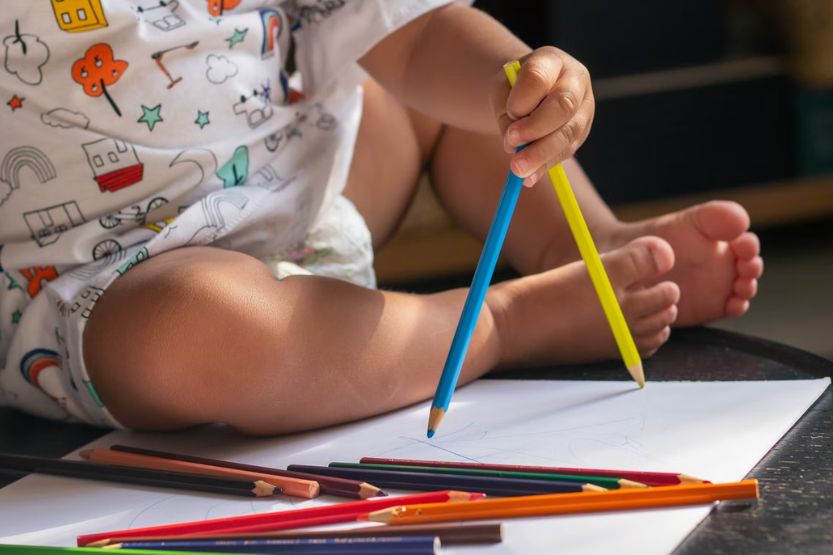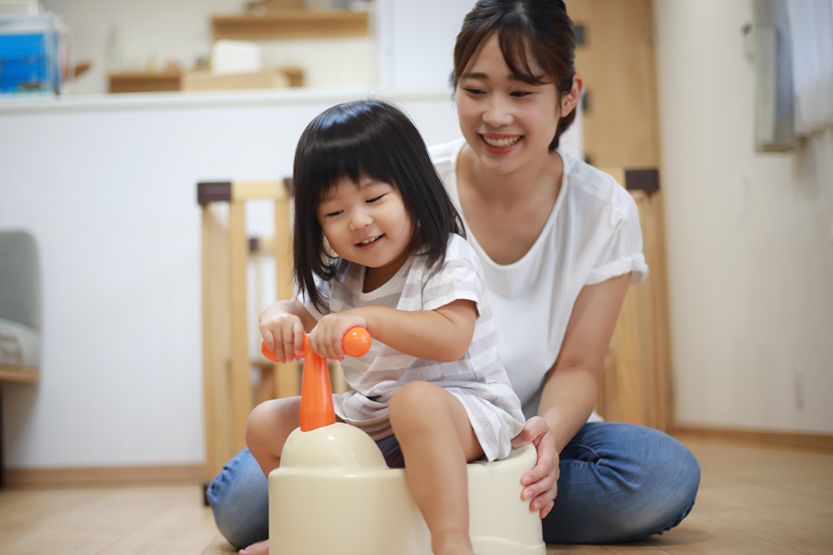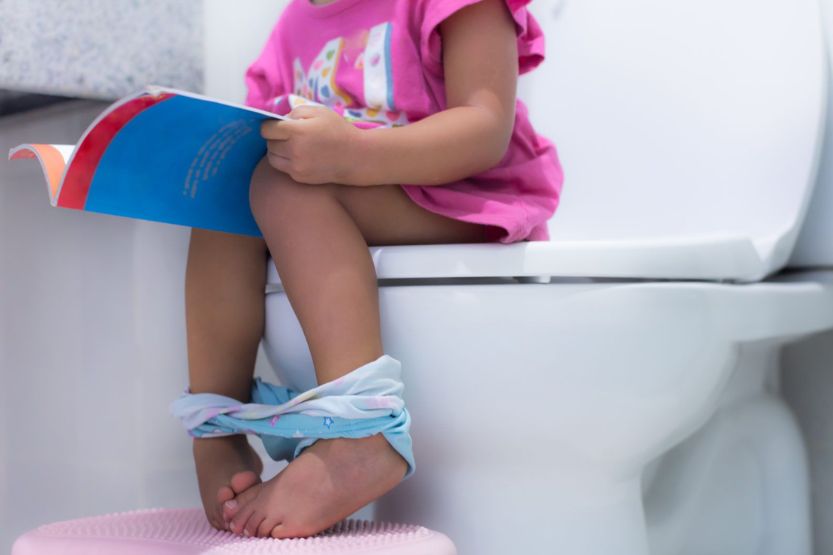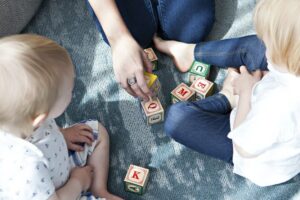It’s never easy to deal with toilet training and nighttime wetting issues. But it’s especially difficult when your child is a bit older than most, and you feel like you’ll never figure out why or what to do about it. Solving this problem alone can be frustrating, but you’re not alone.
While studies show that most children are emotionally and physically ready to start toilet training between the ages of 1.5 and 2, age isn’t the only factor to consider when deciding whether or not it’s time to quit diapers. The developmental readiness of a child and how their caregivers approach potty training play a large part in determining when they can stop wearing diapers.
Read on as we look at why some children stay in diapers long past when they should have been potty trained, as well as potential solutions for the problem.
3-Year-Old Still in Diapers

A three-year-old still using diapers is not unusual, and there are many reasons why this could be the case. A child’s development is highly individualized, meaning some children may develop slower than others.
Physically Not Ready or an Underlying Medical Condition
Some children will continue to use diapers well beyond the age of 3 because they are not yet able to control their bladder or bowel movements properly. This can be caused by various factors, such as physical immaturity or an underlying medical condition.
Autism Spectrum Disorder (ASD)
Children diagnosed with autism spectrum disorder (ASD) are still in diapers at three because they have trouble communicating what they need or want to their parents. This can result in accidents and make it difficult for them to express themselves verbally.
A Sense of Comfort
Some children prefer using diapers instead of toilet training because they feel more comfortable wearing them. In this case, parents should encourage their children to try different toilet training methods until they find the best that works for everyone involved.
4-Year-Old Still in Diapers
A 4-year-old will likely be more resistant to potty training than a younger child, but that doesn’t mean it’s impossible. There are various reasons why your child is still in diapers at 4, and a few of them include:
Budget or Time Constraints
One reason is that the child’s parents may not want or need to change their diaper. This is often due to a lack of finances or time constraints.
Lack of Bladder Control
Another reason a 4-year-old child may still be in diapers is because the child does not have adequate bladder control and cannot hold their urine for long periods.
Fecal Incontinence
A third reason a 4-year-old child may still be in diapers is that they are physically incapable of controlling bowel movements.
5-Year-Old Still in Diapers
A child still in diapers at 5 is not potty trained. But a 5-year-old cannot be expected to be completely independent and self-reliant, especially when it comes to something as important as going to the bathroom like an adult.
They should be allowed to explore and discover new things while developing their identities.
Children Develop at Their Own Pace
Every child develops at their own pace. This is even if that pace seems slow by our standards.
Your Child’s Personality
The best time for training often depends on the personality of your child. Some kids are ready for toilet training earlier than others.
But generally speaking, most children will begin showing signs around age 2 or 3. This indicates that they are developmentally ready for toilet training, such as being able to ask for help with diapers.
6-Year-Old Still in Diapers
Still in diapers at 6? Is it time to switch to underwear? We all know that a 6-year-old should be potty trained, but why are some still in diapers?
If you’re the parent of a 6-year-old who still wears diapers, you might be wondering what’s going on. There are many reasons kids this age need a little help with their potty training, and it’s not always because they’re just not ready.
You should know that three main factors can contribute to your child being in diapers:
- Medical conditions (like cerebral palsy or severe autism)
- Developmental delays
- Behavioral problems
7-Year-Old Still in Diapers
7-year-olds are supposed to be potty trained, right? But what if your kid is still in diapers? Is it bad parenting? Or is something else going on? After all, most kids are potty trained by age 3 or 4.
Most children will naturally initiate the process of potty training themselves as they start to recognize that they need to use the bathroom. If a child has not done this by three years old, it’s a good idea to explore why they may be late.
Psychosocial Issues
Potty training is one of the parents’ most essential and sometimes difficult stages. You may have gone in with no clear end, resulting in a never-ending diaper-changing routine. Your 7-year-old may have psychosocial issues if they don’t have a medical or special-needs disorder.
Sensory Processing Disorder (SPD)
It could be that they have some medical issues such as SPD or sensory processing disorder (SPD), or it could simply be that they’re just not ready yet.
Other Reasons
Some other common reasons why kids are late include:
- A lack of interest in using the bathroom at home;
- Fear of going into new places like public restrooms alone; and
- A strong desire for independence and control over their bodies.
Again, is it normal for 4-year-olds to be in diapers? While some children stop using diapers and finish potty training from 18 to 30 months, some still use diapers even after 4 years of age.
8 Tips for Older Children Still in Diapers

1. Make Potty Training a Positive Experience
I’m not saying that it’s easy to train a child to use the toilet, but it can be made much easier if both parent and child are on the same page about what’s expected.
Remember to keep your expectations realistic since most children will not be fully trained by age 3 or 4. Even older kids may take some time on this journey though they may get there more quickly than you expect.
2. Make Sure Your Child’s Ready to Be Toilet Trained
If you’re considering toilet training, you must watch for signs that your child is ready. A child who’s mentally and physically ready will:
- Understand the concept of using the bathroom;
- Follow simple directions; and
- Sit on a potty or toilet and stay there until they’re told.
If your child isn’t showing these signs when he turns four years old, wait another year and try again. Don’t get frustrated if this happens! There is no reason children should be potty trained at exactly 3, 4, 5, or even six years old.
3. Make the Transition from Diapers to Underwear Gradually
Offer children different types of underwear to choose what feels most comfortable. Some boys like briefs, while others prefer boxers or boxer briefs.
They may also want to wear undies in different styles. An example would be the ones with pictures on them or ones with characters from their favorite TV show or movie. Let them pick out the style they like best and will wear regularly.
Additionally, ensure the underwear fits well and is comfortable for your child to wear for long periods without feeling constricted or irritated by seams rubbing against their skin uncomfortably.
If this happens often enough, it can lead to rashes developing on their bottom area over time. These rashes can be painful if not treated quickly.
4. Use Positive Reinforcement to Help Your Child Learn
This is one of the best ways to teach your child about potty training. This means rewarding good behavior when doing well, making progress toward a goal, trying hard, and cooperating with you.
Using positive reinforcement correctly will encourage your child to want to do more of what you like and less of what you don’t like.
5. Offer Praise Throughout the Process
This relates to tip #4, reinforcing good behavior with a reward. One example would be giving your child a sticker on a potty-training chart each time they use the toilet. This will help them see how often they have used the toilet and might even motivate them to use it more often.
Although it’s important not to push children into potty training before they’re ready, you should still praise them when they do what’s expected.
6. Provide Plenty of Bathroom Opportunities
Provide lots of opportunities for your child to use the toilet. This way, you can help them gain confidence and feel comfortable with the idea of using the toilet.
Some children will be ready to try this at home. However, others may need some time alone in the bathroom at first. If they aren’t ready yet, don’t push them into it too soon.
Remember that this is a process that takes time. But also, don’t let things drag on too long. Try intervening if your child seems uncomfortable about using their diaper despite being able to control their bodily functions.
7. Take Advantage of Any “Teachable Moments”
Another tip for potty training is to take advantage of any “teachable moments.”
When You’re Out
Ask your little one if they need to go when you’re in the grocery store or at a restaurant. If they say yes, try taking them to the restroom and helping them with their training pants or underwear.
Use a Potty Chair or Seat
You may also want to use a potty chair or seat instead of sitting on the toilet while they’re learning to pee standing up, which is an important technique.
Use a Step Stool
Another option is using a small step stool. A potty training step stool can give your child independence during bathroom trips. But make sure you don’t leave this out where it could be an accident waiting to happen.
Have a Potty Chair Near Your Bathroom
You will also want to ensure that you have a potty chair or seat in your bathroom. It’s ideal for the potty chair to be near the toilet so that there’s always one available when your preschooler needs it.
8. If You Get Frustrated, Take a Break From Potty Training for a Day or Two
If you are frustrated, take a break. Every child is different. Some may be ready to be potty trained at three years old, others at four years old, and some may never be ready.
If your child is not showing signs of being ready for potty training yet, then don’t push it. Allowing your child to develop naturally is the best thing you can do for them.
Do not force anything on them until they show interest and understand what it means to make themselves pee or poop in their pants (or diaper).
Frequently Asked Questions – Still in Diapers at 4, 5, and 6

When Should a Child Be Completely Potty Trained?
There’s no one-size-fits-all answer to this question. But the consensus is that a child should be fully potty trained by the time they’re 5 or 6 years old.
Should a 4-Year-Old Still Be in Diapers?
It depends. Many children are potty trained by age 3 or 4. However, some aren’t fully trained until they’re 5 or 6. This can be difficult for parents, who may feel like their child is “behind” or “unready” to be out of diapers and toilet trained.
But it’s important to remember that potty training is a complex process that takes time and patience for both parents and children.
Should a 5-Year-Old Still Be in Diapers?
A 5-year-old can still be in diapers, but it’s not the best option. Most children are ready to move out of diapers at around 3 or 4. But many factors play into when a child is ready to start using the toilet and not a diaper.
These factors include size, mobility, coordination, communication ability, and willingness to use the toilet.
If your child doesn’t seem interested in learning how to use the toilet, try waiting until they express interest before testing it out.
Should a 6-year-old Wear Diapers to Bed?
It’s good to stop using diapers or training pants for nighttime potty training when your child is about six years old.
Even though they help you get more sleep and do less laundry, your child’s brain could start relying on them and not learning to control their bladder at night. It’s important not to stop using diapers abruptly. Gradually reduce their use over a few weeks or months.
Is Bedwetting Common in 7-Year-Olds?
It’s common for young children to wet their beds at night. About 10 percent of 7-year-old kids continue to have nighttime bedwetting problems. Bedwetting, however, usually goes away on its own with time.
Conclusion – Still Wearing Diapers at 4, 5, and 6
It can be overwhelming or scary when your child isn’t potty-trained yet. But you can rest assured that your child will eventually be ready to start using the toilet. And even if they don’t, there are plenty of ways to help them along their journey.
Though it might seem difficult at first, there are a few things you can do to make this transition easier for both yourself and your child. Take these tips into consideration, and start with whatever works best for your family.




